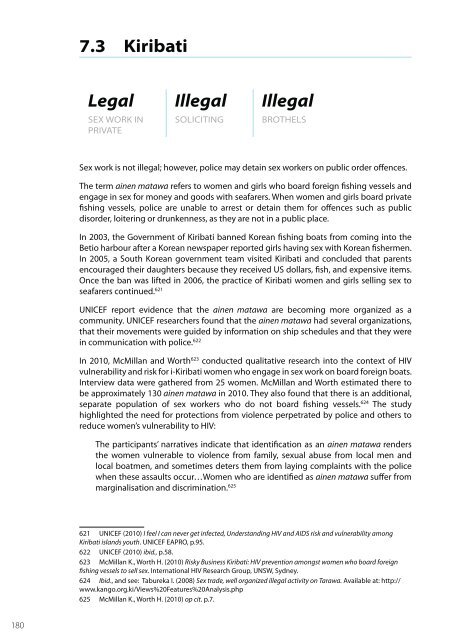SEX WORK AND THE LAW - HIV/AIDS Data Hub
SEX WORK AND THE LAW - HIV/AIDS Data Hub
SEX WORK AND THE LAW - HIV/AIDS Data Hub
Create successful ePaper yourself
Turn your PDF publications into a flip-book with our unique Google optimized e-Paper software.
7.3 Kiribati<br />
Legal<br />
<strong>SEX</strong> <strong>WORK</strong> IN<br />
PRIVATE<br />
Illegal<br />
SOLICITING<br />
Illegal<br />
BRO<strong>THE</strong>LS<br />
Sex work is not illegal; however, police may detain sex workers on public order offences.<br />
The term ainen matawa refers to women and girls who board foreign fishing vessels and<br />
engage in sex for money and goods with seafarers. When women and girls board private<br />
fishing vessels, police are unable to arrest or detain them for offences such as public<br />
disorder, loitering or drunkenness, as they are not in a public place.<br />
In 2003, the Government of Kiribati banned Korean fishing boats from coming into the<br />
Betio harbour after a Korean newspaper reported girls having sex with Korean fishermen.<br />
In 2005, a South Korean government team visited Kiribati and concluded that parents<br />
encouraged their daughters because they received US dollars, fish, and expensive items.<br />
Once the ban was lifted in 2006, the practice of Kiribati women and girls selling sex to<br />
seafarers continued. 621<br />
UNICEF report evidence that the ainen matawa are becoming more organized as a<br />
community. UNICEF researchers found that the ainen matawa had several organizations,<br />
that their movements were guided by information on ship schedules and that they were<br />
in communication with police. 622<br />
In 2010, McMillan and Worth 623 conducted qualitative research into the context of <strong>HIV</strong><br />
vulnerability and risk for i-Kiribati women who engage in sex work on board foreign boats.<br />
Interview data were gathered from 25 women. McMillan and Worth estimated there to<br />
be approximately 130 ainen matawa in 2010. They also found that there is an additional,<br />
separate population of sex workers who do not board fishing vessels. 624 The study<br />
highlighted the need for protections from violence perpetrated by police and others to<br />
reduce women’s vulnerability to <strong>HIV</strong>:<br />
The participants’ narratives indicate that identification as an ainen matawa renders<br />
the women vulnerable to violence from family, sexual abuse from local men and<br />
local boatmen, and sometimes deters them from laying complaints with the police<br />
when these assaults occur…Women who are identified as ainen matawa suffer from<br />
marginalisation and discrimination. 625<br />
621 UNICEF (2010) I feel I can never get infected, Understanding <strong>HIV</strong> and <strong>AIDS</strong> risk and vulnerability among<br />
Kiribati islands youth. UNICEF EAPRO, p.95.<br />
622 UNICEF (2010) ibid., p.58.<br />
623 McMillan K., Worth H. (2010) Risky Business Kiribati: <strong>HIV</strong> prevention amongst women who board foreign<br />
fishing vessels to sell sex. International <strong>HIV</strong> Research Group, UNSW, Sydney.<br />
624 Ibid., and see: Tabureka I. (2008) Sex trade, well organized illegal activity on Tarawa. Available at: http://<br />
www.kango.org.ki/Views%20Features%20Analysis.php<br />
625 McMillan K., Worth H. (2010) op cit. p.7.<br />
180
















